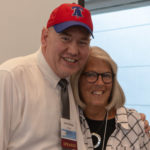News From Our Affiliates — May / June 2019
 California Lake Management Society (CALMS)
California Lake Management Society (CALMS)
The California Lake Management Society (CALMS) would like to encourage you to submit your abstract for the 34th annual conference held on October 10–11 in San Diego, California. Abstracts are due by Friday, July 12, 2019. // California Lake Management Society
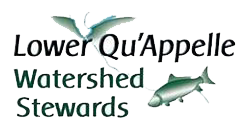 Lower Qu’Appelle Watershed Stewards Undertakes Sewage Survey
Lower Qu’Appelle Watershed Stewards Undertakes Sewage Survey
There are six recreational lakes within our watershed with many resort villages, hamlets and towns that reside along the watershed edge. Water in the Qu’Appelle River watershed is used for many purposes, including for the environmental needs of flora and fauna and for human needs including source water, recreation, industry and agriculture. Our water supplies are of much greater value, for all uses, if water quality and ecosystem functions are maintained. It is critical that the quality of water does not limit or constrain ecosystem services or our use of water.
The Saskatchewan Province implemented a 25 Year Saskatchewan Water Security Plan which contains action statements relating to water quality. Specifically, the 25 Year Plan seeks “To ensure water quality and ecosystem functions are sustained.” One of the Action Areas, speaks to the importance of residential wastewater management and actions that improve the operation, management and compliance of private sewage systems.
The Lower Qu’Appelle River watershed has a high naturally occurring concentration of nutrients. Lakes in the Lower Qu’Appelle River have been eutrophic in the past; however, studies suggest that the abundance of algae has risen. Anthropogenic sources of nutrients are likely to have played a role in increasing the abundance of algae in the Lower Qu’Appelle River watershed. The sources include municipal wastewater, wastewater from private residences and non-point agricultural sources.
The number of private sewage systems that are not operated and managed in compliance with regulations and the volume of sewage discharge is not known. By conducting the sewage survey it is expected that we will learn more about the scale of the problem of private sewage systems that are not operated and managed in compliance with regulations.
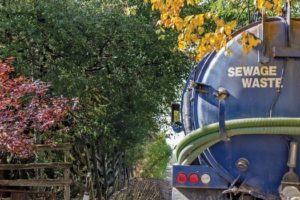 Private sewage systems that are not operated and managed in compliance with regulations may be leaking sewage into surface, ground water or into lakes, streams and rivers. The Lower Qu’Appelle Watershed Stewards Inc. (LQWS), partners with the provinces health region to conduct sewage survey at various recreational communities where landowners reside along the lakes.
Private sewage systems that are not operated and managed in compliance with regulations may be leaking sewage into surface, ground water or into lakes, streams and rivers. The Lower Qu’Appelle Watershed Stewards Inc. (LQWS), partners with the provinces health region to conduct sewage survey at various recreational communities where landowners reside along the lakes.
The goals of the survey are to:
- Bring private sewage systems that are not operated and managed in compliance with regulations into compliance;
- Estimate the number of private sewage systems that are not operated and managed in compliance with regulations;
- Educate the residents on the consequences of not operating and managing private sewage systems in compliance with regulations.
The objectives of the survey are to:
- Pass a sewage collection, storage and disposal bylaw;
- Provide an education program for District residents and encourage voluntary compliance with all relevant bylaws and regulations;
- Conduct a written survey for each residence to assess sewage systems;
- Undertake follow-up investigations for residences deemed at risk of being in non-compliance;
- Encourage compliance through enforcement activities.
We continue to work with local municipal governments and landowners toward undertaking one survey each summer. This survey creates a chance to educate property owners on the consequences of improper disposal of grey water and sewage on the watershed and in the lakes. It created a data base of private sewage systems in order to help identify the contributors of nutrients and other pollutants to the lake. This is important to help determine which nutrient sources must be managed more effectively in order to achieve better water quality.
The LQWS were the recipients of the United Nations Environmental Sustainability Award for this project to help improve the water quality in our lakes.
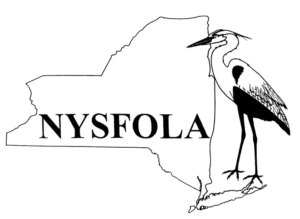 New York State Federation of Lake Associations (NYSFOLA)
New York State Federation of Lake Associations (NYSFOLA)
The New York State Federation of Lake Associations (NYSFOLA) held their 36th annual conference May 3–4 at the Fort William Henry Hotel and Conference Center in Lake George.
Retiring NYS DEC Citizens Statewide Lake Assessment Program (CSLAP) Coordinator Scott Kishbaugh was recognized for over three decades of service to DEC and NYSFOLA. The Scott A. Kishbaugh Secchi Disk Award was created to recognize an outstanding CSLAP volunteer who has shown dedication to CSLAP, NYSFOLA, and his/her lake association. The first recipient of the award was Jan Shields from Babcock Lake Estates. Jan has served as a CSLAP volunteer continuously since 1987 and will be sampling again in the upcoming season. No other CSLAP volunteer has a longer record of service. She has been an active member and leader of the Babcock Lake Estates association for over two decades and served on the NYSFOLA Board of Directors from 2001-2016. During that time, she coordinated the NYSFOLA Media Award and served on various committees, including the CSLAP Committee. Because of her knowledge of CSLAP, she was conscripted for several years to assist with CSLAP training at the NYSFOLA annual conference on Lake Moraine (usually in the years with the most unpleasant weather).
We wish Scott all the best in his retirement, and we thank Jan for her contributions to CSLAP.
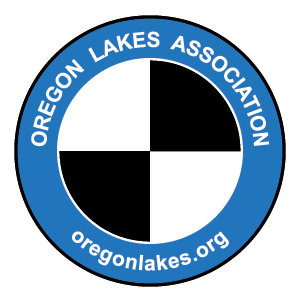 Oregon Lakes Association (OLA)
Oregon Lakes Association (OLA)
The Oregon Lakes Association is accepting oral and poster abstracts for their 2019 conference. Oral and poster presentations will cover a broad range of topics related to Oregon’s lakes, including high desert, mountain, and other lakes on subjects such as harmful algae blooms, water quality, lake and watershed restoration, aquatic invasive species, nutrient cycling, effects of climate change, hydrology, and fauna and flora. Conference attendees will include students, lake association members and residents, recreationists, researchers, educators, tribal representatives, legislators, agency personnel, and anyone with an interest in lakes. If you’d like to submit an oral or poster presentation on these or other lake related subjects, submit your abstract here before September 15. // Oregon Lakes Association

